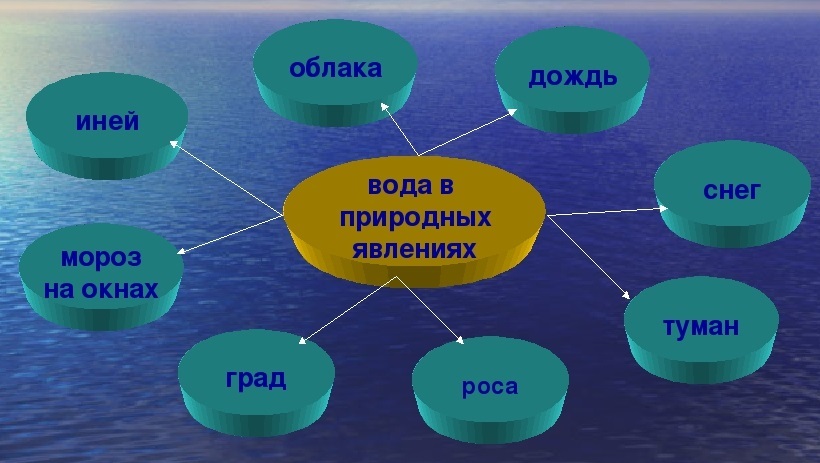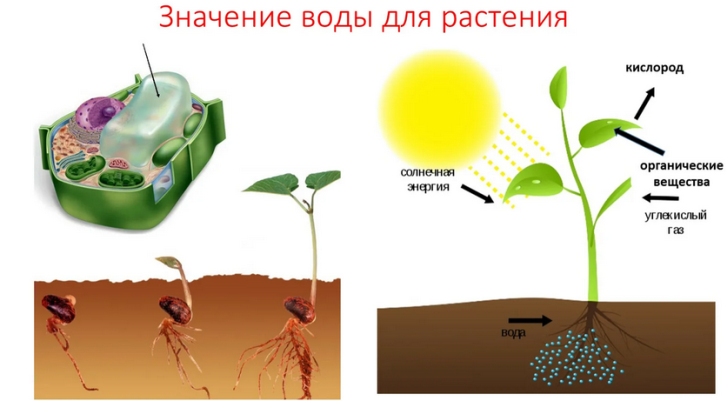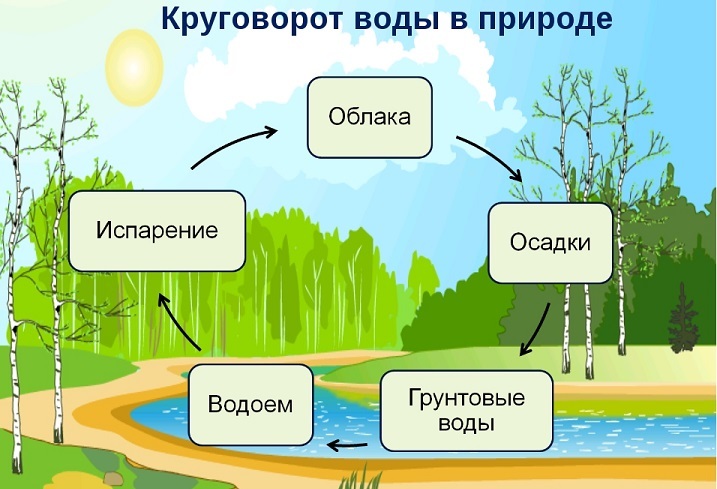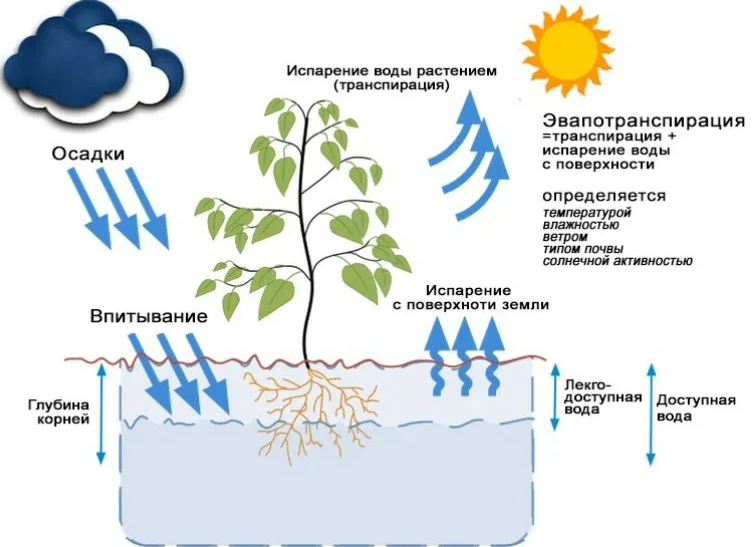"The world" - An important subject for the development of children, which is one of the main in elementary school. Thanks to him, children will learn a lot of interesting and useful information about what surrounds them.
Read on our website another article on the topic: "The life of the city and the village". You will find arguments and comparison for the "surrounding world."
From this article you will learn a lot of useful information about water. This will come in handy in preparation for the lesson. Read further.
Content
- Water in nature: basic functions
- What are the states of water?
- Water in the life of animals - what is the meaning: arguments for the lesson "The World"
- The meaning of water in the life of plants: arguments for the lesson "The World"
- The role and importance of water for human health
- Role and meaning: sanitary-hygienic, endemic significance of water for human life on Earth
- What is the value of the water cycle for life, in nature?
- The value of groundwater in human life, plants, animals
- What is the importance of water evaporation in the life of organisms?
- Water protection from human pollution
- Video: §21, 9 cl. Water in human life
- Video: Water and its role in the life of the cell
- Video: The formation and development of environmental thinking is the basis of a healthy lifestyle of human life
Water in nature: basic functions
Water is one of the most important substances on our planet. There were no living organisms that do not contain water on Earth. Without it, the emergence of the existence of all living things on the planet and life as a whole is impossible. She takes part in most processes in living and inanimate nature.
The main functions of the water are:
- Participation in the processes of the life of various organisms.
- Formation of climate and relief of the planet.
- Distribution and accumulation of energy and substances.
-
This is a universal solvent. Due to the different solubility of substances in water, plasma membranes are formed.
-
It performs a living organism transport function. Substances enter cells and organisms, and are also transferred inside them in the form of aqueous solutions.
-
Plays an important role in the implementation of heat regulation.
-
It is an integral part of the cell of living creatures, mucks formed in the respiratory and digestion organs, as well as the secrets of some glands and organs: digestive juices, bile, saliva, sweat, tears, etc.
Thus, the whole world depends on water, without it there would be no life, and a lifeless desert would reign on the planet.
What are the states of water?
As you can see, water has very positive qualities, so it plays a huge role in many processes. In nature, there are 3 states of this liquid:
- Solid - ice and snow
- Gaseous - steam
- Liquid - water itself

Water in these three states can be found almost anywhere in the world, as well as create yourself. So the water will freeze in the ice if it is frozen in the freezer. And it becomes steam if heated on the stove or in the kettle.
Water in the life of animals - what is the meaning: arguments for the lesson "The World"

In whatever state the water may be, it is still the main component of a living organism. It is of great importance to animal life. Here are the arguments for the lesson "The world":
- In the body of animals, water affects the transport of nutrients, enzymes, hormones, and the metabolism between the cells of the body.
- It also affects the thermal metabolism between organisms and the environment.
- Evalled from the surface of the body, it cools the body of a land animal, from which it becomes cooler.
- For fish and other water creatures, it is no less important. For these animals, water is the environment of their habitat, which they cannot do without several minutes.
- The body of the animal consists of 50-80% of the water. This percentage of water content is unstable and can change, depending on the type of being, its return and a tendency to deposit fat.
The ability of water to maintain life in living organisms is important not only for animals, but also for other living creatures on Earth.
The meaning of water in the life of plants: arguments for the lesson "The World"

In plants, water maintains metabolic processes and is a source of necessary minerals, and power occurs due to it. Therefore, the value of water for the plant world is huge. Here are the arguments for the lesson "The world":
- Plants are almost 90% of water, which makes their fabrics elastic.
- The quantity and quality of water strongly affect plant health, so it is very important that they receive the volume of this fluid they need daily.
-
Water is an environment in which all the life processes of leaves, inflorescences, stems and roots occur.
-
It is part of the cell cytoplasm, gives the form of culture.
-
Mineral salts from the soil enter the organs of the plant in the form of aqueous solutions.
-
Water transports substances through cultural tissues.
-
It participates in the process of photosynthesis.
As you can see, for the plant world, water is of great importance. Below even more useful information. Read further.
The role and importance of water for human health
The human body consists of 70%water.
Water is needed in the body for the main functions of life - this is:
- the absorption of nutrients from food
- metabolism
- maintaining constant body temperature
- removing spent unnecessary products and substances from the body
The loss of a large amount of water is dehydration, very dangerous for human life. The loss of 10% of the water leads to a strong decrease in energy and performance. And the loss of 20-25% of the water is deadly because the blood thickens, and the heart cannot pump such a thick substance through the vessels. Therefore, water is more important for health than food. Without water, a person can live only a few days. And without food, in some cases, even up to 1 month. If you fill the body with water to the norm in time, then all processes in the body are quickly restored.

Role and meaning: sanitary-hygienic, endemic significance of water for human life on Earth
A person is also a living organism and for his life, water is necessary. In addition, for him, water also serves to meet various needs. For example, hygienic. It is also necessary in industrial production. The value of water for human life on Earth can be divided into the following groups:
- Physiological
- Sanitary-hygienic
- Epidemiological
Read more:
Physiological meaning:
- A person needs to drink. Otherwise, he will not be able to exist. This is also manifested by its physiological significance.
The sanitary-hygienic value of water:
- It is manifested in the fact that it is needed to maintain the purity of the body, washing, cooking and washing dishes, cleaning residential premises.
The epidemiological meaning of water:
- It consists in the fact that it may contain various infections and eggs of helminths.
- This is especially true if it was extracted from a contaminated reservoir and did not go cleaned.
- To clean water from pathogens, as a rule, it is enough to boil the liquid.
- In addition, it may contain various chemicals that affect human health. In this case, the water is cleaned in special ways.
- In order for the water to be safe for a person in an epidemiological meaning, it must be purified and mined from pure sources.
As you can see, the value of water is huge for humans not only from physiology, but also from health. Therefore, there are many methods to control the quality of this fluid coming to a person.

What is the value of the water cycle for life, in nature?
You can consider the value of water separately for each creature, but you can also study its value in the global process that flows throughout the planet - the cycle of water in nature.
- The water cycle in nature is the process of moving fluids between ecosystems of nature.
- Its essence is that all the evaporated water from the surface of the planet returns in the form of precipitation.

This process consists of several stages:
- First, under the influence of heat, water begins to evaporate from the surface, in the form of steam.
- Then the pairs rise to the atmosphere, where, under the influence of cold air flows, it becomes a cloud and moves under the influence of wind throughout the planet.
- Over time, precipitation in a liquid or hard state falls out of the cloud, which moisturize the Earth and fill the ponds.
This process is continuous and helps to continue life on Earth. In the process of water cycle, all organisms on Earth are involved, consuming and secreting water. But the influence of a person on this process intensifies, violating him. Since people use water in industry, build reservoirs, drain swamps and build irrigation systems, it turns out that a person mainly takes water and does not return it in full to the natural system. In other cases, he takes water from one sphere, accumulating it to another. In this regard, the drained area no longer has sufficient irrigation in the process of the water cycle.
The value of groundwater in human life, plants, animals

There are a large number of water sources in the world. The most noticeable various rivers and lakes. But there is also a relatively invisible source of water for a person - underground.
In general, water sources are customary to be divided into:
- Superficial sources - rivers, lakes, oceans, glaciers
- Underground - soil, artesian, etc.
Superficial water sources are available for use by their location. But underground have limited fluid outputs to the surface or do not have at all. In this regard, it can be difficult to get to groundwater. However, this does not mean that such sources are not used by a person. Since underground water is rich in mineral salts, useful for health and, in general, as a rule, cleaner than water from surface sources. It has many places of land underground, widely used in the household.
The value of groundwater in human life, plants, animals:
- The water rich in salts is often used to treat people - the adoption of a mineral bath or just drinking according to the scheme.
- Fresh groundwater is used for water supply. Knowing the places of the occurrence of such sources, you can provide people with water even in arid areas.
- Thermal underground waters (having a temperature from 20 aboutC and above) are used to arrange human recreation areas. Water having a temperature of more than 90 aboutC, are used for heating premises instead of using boiler rooms.
- In industry, underground waters go to various purposes, for example, to cool hot materials, used for the manufacture of various substances, and are also used for cleaning the premises.
- For the animal and plant world, underground waters also play an important role. Man by nature is similar to animals, and his habitat along with the habitats of other creatures depends on this source of water.
Although this is not noticeable, groundwater is abundantly moistened with the thickness of the earth, at the same time filling it with reserves of dissolved salts. Thus, even without rain, plants can exist perfectly for some time. Cultures, in turn, are food for herbivores. If the nutrition of plants with water depended only on the amount of precipitation, then the plants would have died, because of which the animals would not have enough food.
In addition, plants create a microclimate, which determines the variety and number of species of animals that live in a particular territory. The thicker and more diverse the vegetation, the more animals inhabit it.
What is the importance of water evaporation in the life of organisms?

Do not forget that from the surface of everything that contains water, under the influence of heat, there is an interesting process called evasion of water.
- This is the process of transition of water into a gaseous state under the influence of heat.
What is its meaning in the life of organisms?
- The evaporation process is an important part of the water cycle in nature. With its help, water in large quantities is transferred from one territory to another. Thus, the water balance on the planet is maintained.
- Also, the evaporation of water determines the humidity. The more water evaporates, the higher the humidity. For human life, air is considered normal with humidity 40-60%.
- Some species of animals and plants are able to live only in strictly defined boundaries of humidity and temperature.
The evaporation process is necessary not only for the cycle of water in nature. All living organisms over time release excess moisture on the surface of the body. Thus, the body gets rid of excess substances in the body and regulates body temperature.
It is worth knowing: In the process of thermoregulation of the body, sweating plays an important role, it allows you to maintain constant body temperature. Thanks to the evaporation of sweat from the surface of the body, the body is cooling.
For plants, the evaporation of water from their surface allows you to ensure the absorption of new water to power cells. But losing a large amount of moisture due to evaporation of plants is unprofitable. Therefore, they adapt to environmental conditions. This is clearly visible on desert vegetation. In order to reduce evaporation from the leaves, they are rigid, and their size is reduced. The size of the plant itself is reduced.
Thus, evaporation plays an important role, both in the global processes of the planet and in individual processes occurring in a particular plant or animal.
Water protection from human pollution
In the modern world, a person greatly affects the environment. Often in the negative side. This may be due to the growth of the population, which requires food, clothing and many different items. To satisfy their needs, people develop and expand their production technologies, in connection with which the negative impact on the environment is intensified. But in the over -time, many programs and measures are already being held to improve the quality of the environment, contaminated by a person.
The protection of water from pollution in the modern world is of great importance:
- Although a person has built various water treatment complexes, this does not solve the problem. Since all the purified water goes to the needs of the person himself, while natural ecosystems are destroyed due to pollution of water sources.
- When polluting natural sources of water, both plants and animals suffer. Poor water can cause irreparable damage to health, and also lead to death.
- First of all, water organisms suffer from pollution. Since they are more sensitive to the composition and quality of their habitat. Focusing on their condition, you can draw approximate conclusions about the quality of water.
There are many causes of water pollution, but several of the most significant groups can be distinguished:
- Industrial production pollution - the discharge of waste water is carried out in a reservoir or land without preliminary cleaning, not far from the plant. As a result, the reservoir is contaminated with various toxic substances from production or pollution by the same substances of the soil and groundwater, which can fall in the place of water discharge.
- Water pollution with wastewater - waste fluid is also carried out in a reservoir or to the landscape without preliminary cleaning.
- Various kinds of accidents - a spill of oil and other combustible mixtures that occurred during the technical malfunction of the vessel, an accident in industrial production, and violation of the sewage system.
- The use of pesticides and chemicals in agriculture - the used substances when processing plants settle on the ground, and then, along with rainwater, seep inward, where they can reach groundwater, or enter surface reservoirs.

To protect water from pollution, a special system of measures has been developed aimed at preventing, restricting and eliminating the consequences of pollution, clogging and depletion of water. It is registered in the legislation and provides for various fines for violation of the rules established in it. For example, it is unacceptable to discharge unpeeled water into water bodies and to the landscape, as well as throw garbage into water bodies.
Some enterprises and settlements to protect water from pollution build special treatment facilities. They filter dirty water to a standard state, and then the purified water is discharged into the reservoir. There are also enterprises that, instead of dumping contaminated water into the river or lake, use it again. This method is called revolutionary water supply. When using this method, waste water is cleaned at special structures of the enterprise and instead of dumping it into a reservoir, it enters the production - economically and environmentally friendly.
The protection of water from pollution is an important matter that should not be neglected. After all, all living things on the planet exists thanks to water, if it does not become, or it will not be suitable for living organisms, life on the planet may stop.
Video: §21, 9 cl. Water in human life
Video: Water and its role in the life of the cell
Video: The formation and development of environmental thinking is the basis of a healthy lifestyle of human life
Read on the topic:







